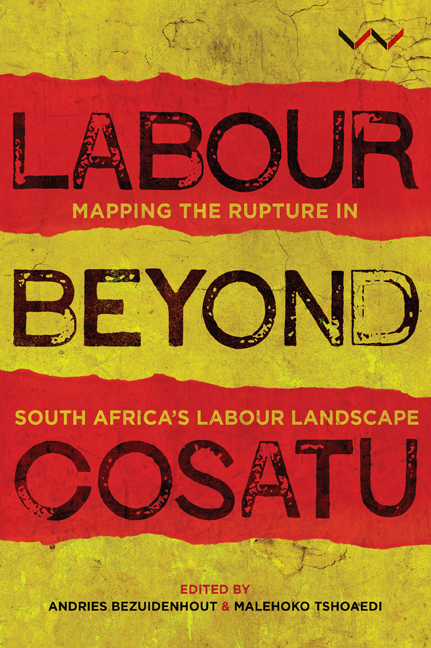Book contents
- Frontmatter
- Contents
- Figures and Tables
- Abbreviations and Acronyms
- Preface
- Chapter 1 Democracy and the Rupture in South Africa's Labour Landscape
- Chapter 2 Research in a Highly Charged Environment: Taking Democracy Seriously, 2014
- Chapter 3 The Social Character of Labour Politics
- Chapter 4 Is Cosatu Still a Working-Class Movement?
- Chapter 5 Labour Aristocracy or Marginal Labour Elite? Cosatu members' income, other sources of livelihood and household support
- Chapter 6 The Politics of Alliance and the 2014 Elections
- Chapter 7 Cosatu, Service Delivery, Civil Society and the Politics of Community
- Chapter 8 The Politics of Male Power and Privilege in Trade Unions: Understanding sexual harassment in Cosatu
- Chapter 9 Internal Democracy in Cosatu: Achievements and challenges
- Chapter 10 Public Sector Unions in Cosatu
- Chapter 11 Are Cosatu's Public Sector Unions Too Powerful?
- Chapter 12 Labour Beyond Cosatu, Other Federations and Independent Unions
- Contributors
- Index
Chapter 2 - Research in a Highly Charged Environment: Taking Democracy Seriously, 2014
Published online by Cambridge University Press: 21 March 2018
- Frontmatter
- Contents
- Figures and Tables
- Abbreviations and Acronyms
- Preface
- Chapter 1 Democracy and the Rupture in South Africa's Labour Landscape
- Chapter 2 Research in a Highly Charged Environment: Taking Democracy Seriously, 2014
- Chapter 3 The Social Character of Labour Politics
- Chapter 4 Is Cosatu Still a Working-Class Movement?
- Chapter 5 Labour Aristocracy or Marginal Labour Elite? Cosatu members' income, other sources of livelihood and household support
- Chapter 6 The Politics of Alliance and the 2014 Elections
- Chapter 7 Cosatu, Service Delivery, Civil Society and the Politics of Community
- Chapter 8 The Politics of Male Power and Privilege in Trade Unions: Understanding sexual harassment in Cosatu
- Chapter 9 Internal Democracy in Cosatu: Achievements and challenges
- Chapter 10 Public Sector Unions in Cosatu
- Chapter 11 Are Cosatu's Public Sector Unions Too Powerful?
- Chapter 12 Labour Beyond Cosatu, Other Federations and Independent Unions
- Contributors
- Index
Summary
INTRODUCTION
At times, the process of conducting fieldwork can be as revealing as the analysis of the data itself. Our experience of conducting the 2014 Taking Democracy Seriously workers’ survey, the fifth of its kind, is an example of such a moment. Over a period of twenty years, members of our teams have been visiting the same factories, mines and workshops in order to interview Cosatu members. In the process we have seen some factories close down and others restructured through various kinds of outsourcing arrangements, especially after trade liberalisation in the mid-1990s. This has had a profound impact on trade unions, especially since they often lose members to unemployment or vulnerable positions in the casualised labour market. In spite of this, insofar as trade unions themselves and the federations they are affiliated to are concerned, the organising landscape itself has remained stable for roughly twenty years.
However, in conducting the 2014 survey we encountered a range of new research challenges related to this seismic rupture in the country's trade union dispensation. It was the first time we were unable to get formal approval from the federation. Instead, we had to rely on cooperation from affiliates. It was also the first time we encountered real rivalry at the workplace between trade unions from the same federation. In some cases we would go to factories previously organised by one Cosatu affiliate, only to encounter the leadership of a rival union from the same federation representing workers. We also conducted our fieldwork during the longest mining strike in South African history, led by the Association of Mineworkers and Construction Union (Amcu), a union that is not affiliated to Cosatu. In Rustenburg we even received death threats in the course of attempts to interview mineworkers for the survey, raising new ethical challenges not encountered before. In short, we conducted the research in a highly charged environment.
Some of the challenges we have faced are not entirely new. Since 2008, with the launch of the Congress of the People (Cope) as a party split off from the ANC, the Taking Democracy Seriously research teams have noted how the political climate has affected the research process (Bischoff and Tshoaedi 2012; Buhlungu 2006). In 2014 this was no different, but the impact was more profound and presented us with unusual research challenges that determined how we negotiated access to the workplaces.
- Type
- Chapter
- Information
- Labour Beyond CosatuMapping the Rupture in South Africa's Labour Landscape, pp. 18 - 36Publisher: Wits University PressPrint publication year: 2017

